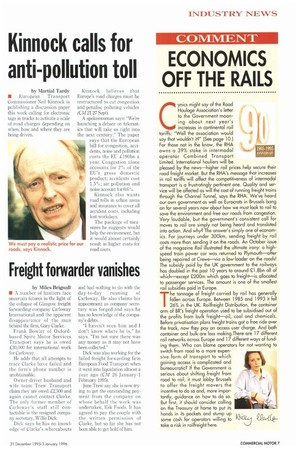ECONOMICS OFF THE RAILS
Page 9

If you've noticed an error in this article please click here to report it so we can fix it.
Cynics might say of the Road Haulage Association's letter vto the Government moaning about next year's increases in continental rail tariffs: "Well the association would say that wouldn't it?" (See page 10.) For those not in the know, the RHA owns a 39% stake in intermodal f A.. operator Combined Transport
Limited. International hauliers will be
pleased by the news—higher rail prices help secure their road freight market. But the RHA's message that increases in rail tariffs will affect the competitiveness of intermodal transport is a frustratingly pertinent one. Quality and service will be affected as will the cost of running freight trains through the Channel Tunnel, says the RHA. We've heard our own government as well as Eurocrats in Brussels bang on for several years now about how we must look to rail to save the environment and Free our roads from congestion. Very laudable, but the government's consistent call for moves to rail are simply not being heard and translated into action. And why? The answer's simply one of economics. For journeys under 300km, sending freight by rail costs more than sending it on the roads. An October issue of the magazine Rail illustrated the ultimate irony: a highspeed train power car was returned to Plymouth—after being repaired at Crewe—via a low-loader on the roads! The subsidy paid by the UK government to the railways has doubled in the past 10 years to around 21.8bn all of which—except £200m which goes to freight—is allocated to passenger services. The amount is one of the smallest rail subsidies paid in Europe. The tonnage of freight carried by rail has generally fallen across Europe. Between 1985 and 1993 it Fell 26% in the UK. Railfreight Distribution, the container arm of BR's freight operation used to be subsidised out of the profits From bulk freight—oil, coal and chemicals. Before privatisation plans freight trains got a free ride over the track, now they pay an access user charge. And both container and bulk are loss making.There are 17 different rail networks across Europe and 17 different ways of funding them. Who can blame operators for not wanting to switch from road to a more expensive form of transport to which gaining access is complicated and bureaucratic? If the Government is serious about shifting freight from road to rail, it must lobby Brussels to offer the freight movers the incentive to do so and, more importantly, guidance on how to do so. But First, it should consider calling on the Treasury at home to put its hands in its pockets and stump up some cash for operators willing to k/tCli-j UMfe-take a risk in railireight here.




























































































































